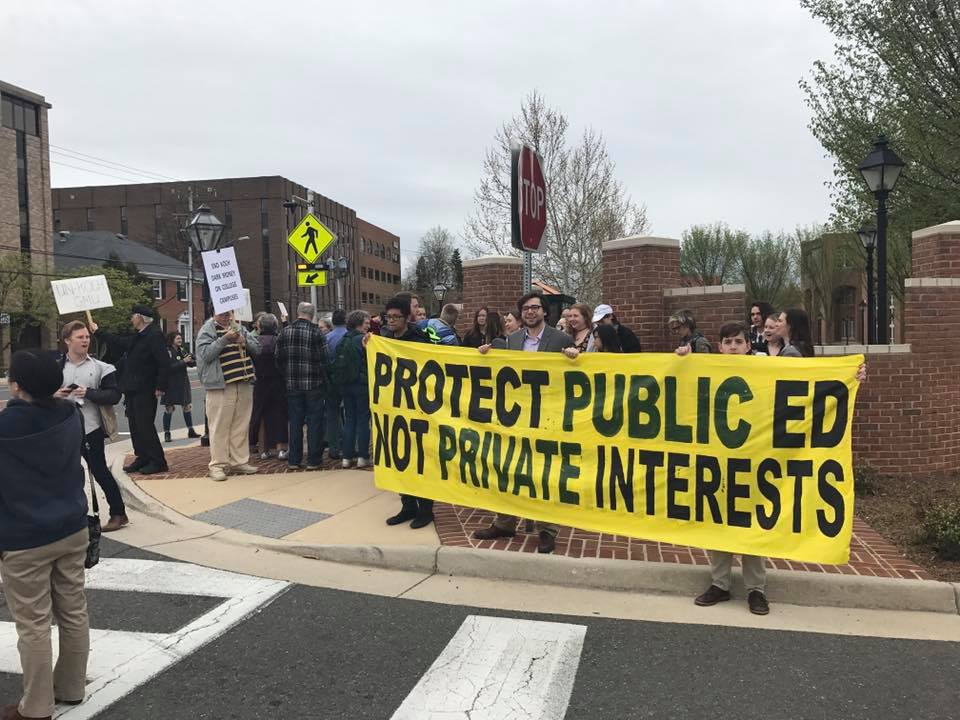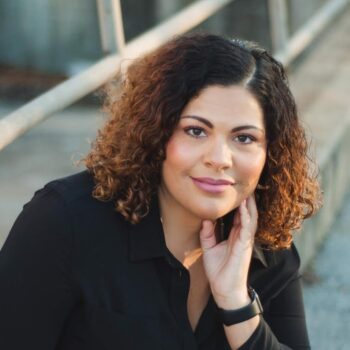“How does this help people like me or my Black, transgender daughter?”
I had just started as a digital organizing contractor for UnKoch My Campus, a campaign that used investigative research and reports to undermine the influence of corporate donors like the Koch brothers on college campuses. The Kochs regularly circumvent academic freedom by donating money to schools in exchange for sway over faculty hired, courses offered, and curriculum taught. I was committed to the UnKoch campaign’s goal of challenging right-wing influence over higher education and, especially, critical areas of research, like climate change.
But I found myself returning to the question: “How does this help people like me or my Black, transgender daughter?” The majority white leadership could not articulate how their model would lead to broader political transformation. They sought to restore academic freedom, but the question remained: restored to what and for whom?
Higher education has never been safe or welcoming for those of us impacted by structural racism. As Armond Towns put it in a piece about UnKoch My Campus, “One would be hard pressed to find a U.S. higher education institution that has not benefited from slavery and/or indigenous violence, both of which were necessary to clear lands for higher education institutions to rest on in the first place.” To this day, there is a racial hierarchy in higher education. Black and Latinx youth — particularly those from low-income backgrounds — are underrepresented at four-year colleges and overrepresented at open-access, two-year institutions. Along with women of all races, Black and Latinx students are also underrepresented in fields such as engineering, mathematics, statistics, and the physical sciences. These inequalities are not anomalies; they are part of the design.
The Koch brothers are not infiltrating institutions of higher education. To the contrary, these institutions are functioning exactly how their architects intended: as vehicles for reproducing racial, class, and gender power. “UnKoching” a college or university campus remained a valuable organizing tool. But to truly “unKoch” the academy, we needed to challenge entrenched gender, class, and racial inequities on campus and open up space for reimagining institutions of higher education.
UnKoched Organizing
Fast forward three years. After internal shifts and upheaval, I became the executive director of UnKoch My Campus. One of the first things I did was to critically evaluate white supremacy culture within the project, both in our strategies and our organizing tactics. We adopted a new strategic approach that centered the fight to preserve our democracy by protecting higher education from those who want to place private interests over the common good.
With this new strategic vision, we began to organize communities directly impacted by billionaire philanthropists who use their class status to remake higher education in their own image. The Kochs fund over 300 schools across the country, so we focused on campuses where they had the capability to do the most harm. For example, at schools like George Mason University or Arizona State University, the Kochs have funded think tanks and centers where they not only push Koch-aligned ideals (such as climate misinformation) but also produce lawyers and judges who go on to promote a pro-corporate agenda.
Our network of grassroots student activists engage in a variety of tactics to demand their schools break ties from the Kochs and their networks, from online petitions and targeted digital actions to on-the-ground actions where UnKoch My Campus convenes, trains, and coordinates events and demonstrations. During our annual Day of Action, students, faculty, and community members stand up against the Kochs through a collective power-building network facilitated by the UnKoch My Campus team.
Our work has made a difference. George Mason University, Koch’s top-funded campus, became the first university to alter its gift acceptance policy based on our recommendations and organizing work. We have also seen victories in Arizona. Working in partnership with our campus group in Tucson, we successfully fought to remove the Koch-funded curriculum from high schools in the Tucson Unified School District. We also prevented Arizona State University from deeming a Koch-backed Philosophy, Politics, Economy and Law class as a general education requirement. In partnership with Granite State Progress, we’ve leveraged our expertise on the Koch network’s influence over the courts to prevent a Koch-affiliated Attorney General from becoming the next chair of New Hampshire’s Supreme Court.
Shifting the Frame
Though these actions have made an impact, we realized that we needed to shift our frame beyond a narrow focus of the Koch brothers to address the underlying social structures that facilitate the corporatization and privatization of institutions of common good.
Here are a few of our previous narrative frames:
-
The Koch Brothers don’t care about academic freedom.
-
The Koch Brothers use their donations to further their interests, which hurt the climate and roll back social and economic progress.
-
Transparency is the first step toward addressing corruption in higher education.
-
Undue donor influence can be confronted through real power for student and faculty senates.
-
Pro-corporate donors and actors are infiltrating and capturing higher education institutions for their private interests.
These frames failed to address the ways that academia is complicit in deepening structural inequities. Of course, wealthy donors have more resources to leverage an already violent infrastructure, but it is intellectually dishonest to assert that higher education institutions actually serve low-income communities and communities of color.
Our current narrative frames address these bigger structural inequities:
-
Elevating the private interests of corporations and the wealthy over the common good catalyzes structural oppression. Disrupting this strategy builds a more just society where communities can grow.
-
It is imperative that communities recover the power to shape the institutions they value, free of corrupt influences.
-
Constructive and generative conflict is necessary and critical to transform our communities in service of a more just world.
-
Shared and appropriate governance is vital to break free from corrupt hierarchical structures that threaten the common good.
-
Education and the advancement of knowledge are foundational to democracy.
-
To protect our democracy, we must demand the independence of our colleges and universities from private and corporate interests.
As we began implementing these narrative frames in our campaigns, we realized we needed to create an organizational mission that would allow our activists and organizers to adopt — and fight for — a broader vision of equitable and transformative higher education institutions. We would keep UnKoch My Campus as a project, and keep “unKoching” as a tactic, while building up a “common good generation” within our collective of over 3000-plus organizers and activists.
One of our most popular campaigns to date happened after this narrative shift. #CopsOffCampus was birthed from the growing frustrations of students, faculty, and community members who saw the racist impact of carceral systems on campus. Folks from campuses across the country signed on to demand that their administrations divest from local police departments. Due to COVID-19, in-person demonstrations weren’t feasible, but our grassroots activists used social media, Zoom calls, and our online toolkits to rally support. Some student campaigns are pushing even farther, demanding tuition strikes until their schools make campuses safer for Black and non-Black students, faculty, and staff.
Working within the limits of digital activism, we have started hosting regular webinars, where we bring in experts to speak with activists. During our networking calls, students help each other, with more experienced activists offering words of wisdom or tried-and-true tactics to those just starting out. In some ways, our shift in focus — combined with the limitations of organizing during the pandemic — has allowed us to cast a wider net, gathering student activists from different geographies and experiences. This has been a powerful way to show students that they are not alone.
A Common Good Generation
Going after bad actors should not be an end in itself but a vehicle for systemic transformation. The problem with higher education goes beyond dark money donors. People like the Koch brothers carry so much power within higher education because white supremacy, patriarchy, and capitalism have convinced us all that public goods are commodities that can be offered up to the highest bidder.
Higher education organizing must reject the limited framework offered by neoliberalism and build a “common good generation” willing to fight for an academy that provides care instead of cops, community governance instead of hierarchical domination, and a sustainable climate over profit-based data and misinformation. Institutions of education must be reclaimed to respond to the needs of communities rather than the needs of shareholders. We are no longer for sale.

